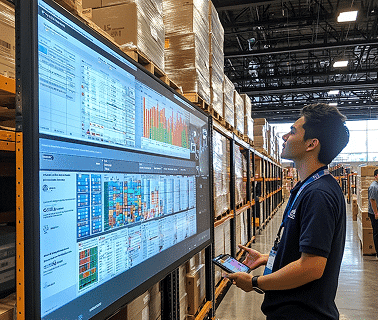The administration of all processes involved in producing and delivering goods and services to clients is known as supply chain management, or SCM. Supply chain operations must be designed, planned, carried out, controlled, and monitored to add value, lower costs, and boost efficiency. Supply chain management in GCC is essential for firms to maximize productivity, cut costs, and guarantee client pleasure.
SCM covers various aspects, such as purchasing, inventory control, logistics, shipping, warehousing, and distribution. Collaboration, communication, and integration across these domains and between all supply chain partners—suppliers, manufacturers, distributors, and retailers—are necessary for effective SCM.
Increasing customer happiness, decreasing costs, improving product quality and delivery, strengthening supplier relationships, and controlling supply chain logistics in GCC are just a few of the main goals of SCM. To accomplish these goals, businesses utilize various methods and technologies, including forecasting, demand planning, supplier management, lean manufacturing, just-in-time inventory management, and advanced analytics.
What is supply chain management?
The administration of the complete movement of products, services, and information from raw materials through finished items and finally to customers is known as supply chain management (SCM). The processes involved in creating and delivering goods or services, such as sourcing and procurement, production, shipping, warehousing, inventory management, and customer support, must be coordinated and optimized as part of supply chain management in GCC.
SCM’s goal is to provide value for the client by offering goods or services that satisfy their demands while reducing costs and boosting productivity across the whole supply chain. The supply chain components, from suppliers to manufacturers to distributors to retailers, must work together and integrate to achieve this.
Businesses that use effective supply chain logistics in GCC may save costs, boost productivity, develop supplier relationships, improve product quality and delivery, and control supply chain risks. SCM is crucial for sustainability because it may reduce waste production, cut carbon emissions, and encourage moral and ethical company conduct.
Importance of supply chain management
Supply chain management in GCC is essential for enterprises and organizations of all sizes and sectors. Here are some main arguments in favor.
- Customer satisfaction increases when businesses offer clients goods and services more quickly, effectively, and affordably. Increased consumer satisfaction and loyalty may arise from this.
- SCM may assist companies in streamlining their operations and lowering costs across the whole supply chain. This may be accomplished by reducing waste, raising productivity, and simplifying procedures.
- Good supplier relationships may help companies get better deals, higher-quality products, and more dependable deliveries. SCM can assist in creating and preserving these connections.
- SCM makes better decision-making possible, which gives firms access to real-time data and supply chain insights. They may use this information to make better manufacturing, logistics, inventory management, and procurement decisions.
- Sustainability is promoted by SCM, which may assist companies in cutting waste, lowering carbon emissions, and fostering moral and ethical corporate conduct. This can improve the company’s reputation and draw in consumers who care about the environment.
- Effective SCM is crucial for firms to maintain competitiveness, increase profitability, and satisfy the changing requirements of stakeholders and consumers.
Scope of supply chain management in GCC countries
Depending on each country’s unique economic and industrial characteristics, the scope of supply chain management (SCM) differs across the GCC. Below is a list of some of the main GCC supply chain industries:
- Saudi Arabia: Saudi Arabia’s SCM encompasses logistics and transportation, procurement and sourcing, supply chain planning and optimization, and e-commerce and digitalization. Saudi Arabia, the largest economy in the GCC, is spending money on cutting-edge innovations, including integrated supply chain management systems and smart logistics parks.
- UAE: The UAE is a significant center for supply chain logistics in GCC, and its SCM scope covers freight forwarding, warehousing, and customs clearing. The UAE also spends money on cutting-edge technologies like blockchain and IoT to enhance supply chain transparency and efficiency.
- Qatar: The scope of Qatar’s SCM covers logistics and transportation, supply chain planning and optimization, and procurement and sourcing. To lower carbon emissions and advance environmental sustainability, Qatar is funding the creation of a green logistics center and other sustainable supply chain solutions.
- Kuwait: The logistics and transportation, purchasing and sourcing, and supply chain planning and optimization are all included in Kuwait’s SCM scope. To strengthen its supply chain operations and increase its e-commerce skills, Kuwait is also concentrating on developing its e-commerce capabilities to enhance its supply chain operations and improve customer satisfaction.
- Bahrain: Bahrain’s SCM scope includes logistics and transportation, supply chain planning and optimization, and e-commerce and digitalization. Bahrain is investing in developing its logistics and transportation infrastructure, including expanding its airport and seaport facilities.
- Oman: Oman’s SCM scope includes logistics and transportation, supply chain planning and optimization, and e-commerce and digitalization. Oman is improving its logistics infrastructure, including developing a new logistics center and expanding its airport and seaport facilities.
The scope of supply chain management in GCC varies based on their unique economic and industrial strengths. Still, all focus on optimizing supply chain operations to improve efficiency, reduce costs, and enhance customer satisfaction.
Know more about high-paying jobs in supply chain and the role of SCM in e-commerce industry.
Become a supply chain professional with MAHE
Manipal Academy of Higher Education (MAHE) provides online PGCP in Logistics and Supply Chain
(PGCP LSCM) to excel in the supply chain industry. This program is designed to give students a thorough grasp of SCM ideas, resources, best practices, and useful skills they can use in the real world.
Supply chain management fundamentals, such as procurement, logistics, inventory management, and supply chain optimization, are covered in this certificate program. This program addresses supply chain risk management, demand forecasting, and strategic sourcing.
This programs are intended for seasoned supply chain professionals who wish to expand their knowledge in the field. They give students knowledge and skills they can use immediately to get wonderful job opportunities in GCC supply chain management.
Click here to know more benefits of earning a supply chain management certificate.
Conclusion
Following the trends in supply chain management is crucial in the current global corporate environment. Maximizing supply chain operations and raising customer satisfaction entails coordinating and managing activities connected to manufacturing, distributing, and acquiring products and services.
With an emphasis on logistics and transportation, purchasing and sourcing, supply chain planning and optimization, e-commerce and digitization, sustainability, and social responsibility, the scope of supply chain management in GCC nations is varied and continuously growing.
People may acquire the information and skills necessary to succeed as supply chain experts and help businesses and organizations working in the area by enrolling in online PGCP in logistics supply chain management course, such as those provided by MAHE.
Prepare for your next career milestone with us








